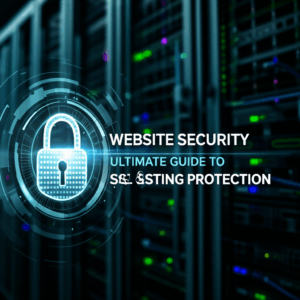- Understanding the Importance of Website Security
- SSL Certificates: Locking Down Your Data
- Types of SSL Certificates
- Benefits of Implementing SSL
- Hosting Protection: Shielding Your Server
- Key Elements of Robust Hosting Protection
- Website Security Best Practices: A Holistic Approach
- SSL & Hosting Protection: A Necessary Investment
Website Security: Ultimate Guide to SSL & Hosting Protection
Website security is paramount in today’s digital landscape. With cyber threats becoming increasingly sophisticated, safeguarding your website and user data is no longer optional, but a necessity. This comprehensive guide delves into two crucial aspects of website security: SSL certificates and robust hosting protection. Understanding and implementing these measures can significantly reduce your vulnerability to attacks and build trust with your visitors.
Understanding the Importance of Website Security

In an era where data breaches and cyberattacks are rampant, a secure website is the cornerstone of online trust and business success. A compromised website can lead to data theft, financial loss, reputational damage, and even legal repercussions. Investing in robust security measures not only protects your business but also instills confidence in your customers, encouraging them to engage and transact with peace of mind.
SSL Certificates: Locking Down Your Data
SSL (Secure Sockets Layer) certificates are the bedrock of secure online communication. They encrypt the data transmitted between a user’s browser and your website server, preventing eavesdropping and data manipulation. When a user visits an SSL-secured website, their browser displays a padlock icon in the address bar, signifying a secure connection.
Types of SSL Certificates
Choosing the right SSL certificate depends on your specific needs. Here are the most common types:
Single Domain SSL: Secures a single domain name (e.g., www.example.com).
Wildcard SSL: Secures a primary domain and all its subdomains (e.g., .example.com, covering blog.example.com, shop.example.com, etc.).
Multi-Domain SSL (SAN): Secures multiple distinct domain names (e.g., example.com, example.net, anotherdomain.com) under a single certificate.
Extended Validation (EV) SSL: Offers the highest level of assurance by verifying the organization’s identity, displaying the company name in the address bar, and often turning the address bar green.
Benefits of Implementing SSL
The benefits of installing an SSL certificate extend beyond just encryption:
Improved SEO: Search engines like Google prioritize secure websites, giving them a ranking boost.
Enhanced User Trust: The padlock icon and HTTPS in the address bar visually reassure users that their information is safe.
PCI Compliance: Essential for e-commerce websites processing credit card payments, SSL is a requirement for PCI DSS compliance.
Protection Against Phishing Attacks: SSL helps prevent fraudulent websites from impersonating your site and stealing user data.
Hosting Protection: Shielding Your Server
While SSL secures data in transit, robust hosting protection safeguards your website at the server level. A secure hosting environment is critical for preventing malware infections, DDoS attacks, and other threats.
Key Elements of Robust Hosting Protection
Choosing a hosting provider with strong security features is crucial. Look for these essential elements:
Firewall Protection: A firewall acts as a barrier between your server and the internet, blocking malicious traffic.
Malware Scanning and Removal: Regular malware scans detect and eliminate malicious code that could compromise your website.
Intrusion Detection and Prevention (IDP): IDP systems actively monitor for suspicious activity and automatically block potential threats.
DDoS Protection: Distributed Denial of Service (DDoS) attacks flood your server with traffic, rendering your website inaccessible. Effective DDoS mitigation is crucial.
Regular Backups: Regular backups ensure that you can restore your website quickly in case of data loss due to attacks, hardware failures, or human error.
Server Hardening: This involves configuring server settings to minimize vulnerabilities and improve security.
Website Security Best Practices: A Holistic Approach
Beyond SSL and hosting protection, implementing these best practices can further enhance your website’s security posture:
Strong Passwords and Two-Factor Authentication: Enforce strong, unique passwords for all user accounts and implement two-factor authentication for added security.
Regular Software Updates: Keep your website’s software, including CMS platforms, plugins, and themes, up-to-date to patch security vulnerabilities.
Web Application Firewall (WAF): A WAF filters malicious traffic specifically targeting web applications, providing an additional layer of protection.
* Security Audits: Regular security audits help identify vulnerabilities and weaknesses in your website’s security infrastructure.
SSL & Hosting Protection: A Necessary Investment
Investing in website security, particularly SSL certificates and robust hosting protection, is not an expense, but an investment. By prioritizing security, you protect your business, build customer trust, and contribute to a safer online environment. By implementing the strategies outlined in this guide, you can significantly strengthen your website’s defenses and mitigate the risks associated with cyber threats.











Leave a Reply